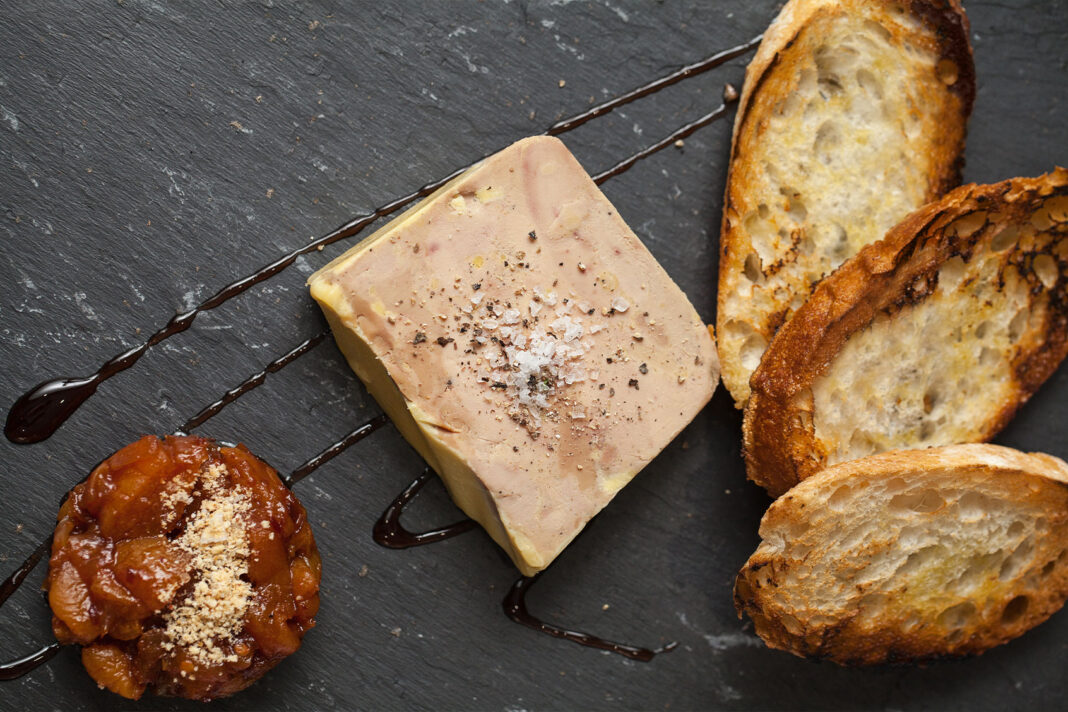— Shares Facebook Twitter Reddit Email Foie gras, one of the most controversial foods for animal activists and ethical eaters alike, is possibly entering its meatless era. Related “The key to a healthy, animal-free diet,” according to a nutrition expert The traditional foie gras process involves force feeding duck or geese until their livers expand; the engorged liver is actually what actually becomes the foie gras itself, which is then often sold in various fine dining establishments. Reuters notes that “f oie gras was officially classified as part of the ‘cultural and gastronomic heritage’ of France but some countries and U.
S. states such as California and New York have considered banning it because of on animal welfare concerns. ” Beyond losing ground in fine dining because of ethical implications, the production foie gras has also been diminished by the devastating bird flu throughout Europe.
But thanks to a new crop of plant-based alternatives, a new-and-updated version of the dish may end up back on restaurant menus and in grocery stores in the coming years. As Luke Gralia of The Takeout reported earlier this week, one version of “faux” gras — as it has come to be called — was designed by French chef Fabien Borgel. Borgel, who manages 42 Degres restaurant in Paris, sells ” foie ” containing cashews, sunflowers and coconut oil, as reported by Reuters.
He originally created the product two years ago. Demetrius Simms at Robb Report also published an article about Borgel’s faux gras in December 2022, stating that “the combined result appears similar to traditional foie gras, but has a creamier texture. ” Simms also argues that there is a health benefit in the trade-off, as the vegan alternative contains less fat.
He further reports that Gourmey , a French start-up specializing in plant-based foods and cultivated meat, is also presently “working on a lab-grown version [of foie gras]. ” Beyond Borgel’s restaurant iteration, Spanish company Hello Plant Food sells a vegan foie called ” Fuah !” in grocery stores in both spreadable and sliceable iterations. It has sold incredibly well since its released at the end of 2022, as reported by Ashifa Kassam of the The Guardian .
For a while now, the internet has been littered with countless recipes for homemade “faux gras” — sometimes also called vegan or lentil pâté — but it becoming increasingly commercialized points to a shift in the overall meatless industry. Given its association with fine dining, vegan foie could be the thing that convinces some who have been hesitant to try plant-based alternatives to give them a try. The price for these products will be also lower than foie gras, which could render this elite dish both more morally palatable and perhaps even weeknight-friendly.
Want more great food writing and recipes? Subscribe to Salon Food’s newsletter , The Bite. Foie is just one arena, though. The market for plant-based or vegan items has positively exploded in recent years; even just five years ago, a stroll through the grocery store, or even a perusing of local restaurant menus, yielded much fewer vegan-friendly offerings.
From plant-based cheeses to Impossible Burgers to ” animal-free ” ice creams and even ribs, the sheer breadth is something to witness. According to this State of the Marketplace report from Plant Based Foods , “plant-based foods have been catapulted into the spotlight, powering considerable success, rapid evolution, and incredible innovation in a short period of time. ” To put a number on it, plant-base foods reached a “record $8 billion in U.
S retail sales,” while “plant-based foods captured 6. 4% of total online sales, compared to a steady 4. 5% share in grocery retail.
” Furthermore, nearly half of U. S restaurants now feature plant-based foods, “a percentage that has grown steadily, without decline, over the past decade. ” As reported by Anna Starostinetskaya in VegNews last month, this isn’t just a game for small, up-and-coming vegan food start-ups.
Even giants like Kraft are getting into the game. The company is now selling three different flavors of vegan cheese single slices in retailers across the country. “The Kraft NotCheese Slices first debuted last fall in a limited-run test market in Cleveland,” Starostinetskaya notes, and performed well enough that they announced national distribution.
Clearly, moving into the plant-based or “animal-free” food space is not meant for just niche companies anymore, further evidenced by the fact that, according to The Takeout’s Gralia, Nestle is also currently tinkering with a vegan foie option called “Voie Gras,” containing soy, miso and truffle. It remains to be seen how quickly restaurants will pick up “faux gras,” but its potential proliferation seems like a positive — especially the ducks and geese. Read more about this topic Plan your weeknight meals around this plant-based, budget-friendly superfood A cynic tries plant-based bacon Could we all be buying lab-grown meat soon? MORE FROM Michael La Corte Advertisement:.
From: salon
URL: https://www.salon.com/2023/07/15/how-a-more-ethical-faux-gras-could-change-fine-dining-and-vegan-cuisine/



